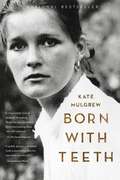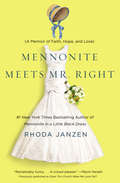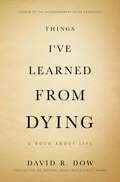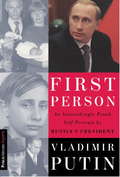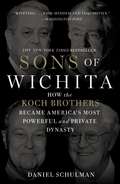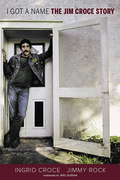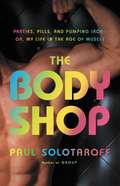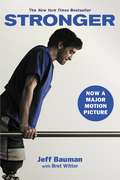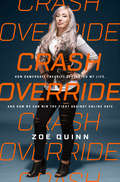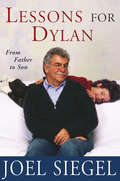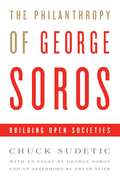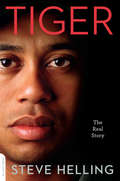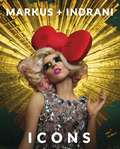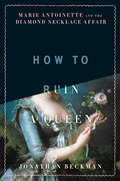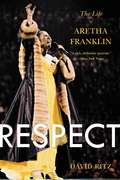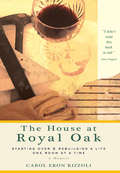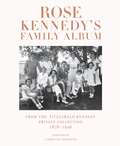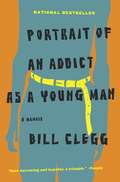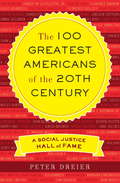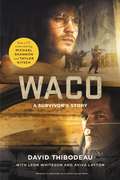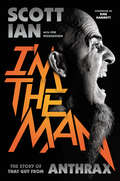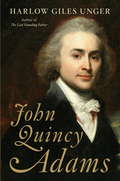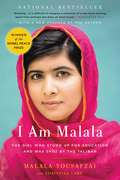- Table View
- List View
Born with Teeth: A Memoir
by Kate MulgrewRaised by unconventional Irish Catholics who knew "how to drink, how to dance, how to talk, and how to stir up the devil," Kate Mulgrew grew up with poetry and drama in her bones. But in her mother, a would-be artist burdened by the endless arrival of new babies, young Kate saw the consequences of a dream deferred. Determined to pursue her own no matter the cost, at 18 she left her small Midwestern town for New York, where, studying with the legendary Stella Adler, she learned the lesson that would define her as an actress: "Use it," Adler told her. Whatever disappointment, pain, or anger life throws in your path, channel it into the work.It was a lesson she would need. At twenty-two, just as her career was taking off, she became pregnant and gave birth to a daughter. Having already signed the adoption papers, she was allowed only a fleeting glimpse of her child. As her star continued to rise, her life became increasingly demanding and fulfilling, a whirlwind of passionate love affairs, life-saving friendships, and bone-crunching work. Through it all, Mulgrew remained haunted by the loss of her daughter, until, two decades later, she found the courage to face the past and step into the most challenging role of her life, both on and off screen.We know Kate Mulgrew for the strong women she's played--Captain Janeway on Star Trek; the tough-as-nails "Red" on Orange is the New Black. Now, we meet the most inspiring and memorable character of all: herself. By turns irreverent and soulful, laugh-out-loud funny and heart-piercingly sad, BORN WITH TEETH is the breathtaking memoir of a woman who dares to live life to the fullest, on her own terms.
Does This Church Make Me Look Fat?: A Memoir of Faith, Hope, and Love
by Rhoda JanzenWhat does it mean to give church a try when you haven't really tried since you were twelve? At the end of her bestselling memoir Mennonite in a Little Black Dress, Rhoda Janzen had reconnected with her family and her roots, though her future felt uncertain. But when she starts dating a churchgoer, this skeptic begins a surprising journey to faith and love.Rhoda doesn't slide back into the dignified simplicity of the Mennonite church. Instead she finds herself hanging with the Pentecostals, who really know how to get down with sparkler pom-poms. Amid the hand waving and hallelujahs Rhoda finds a faith richly practical for life--just in time for some impressive lady problems, an unexpected romance, and a quirky new family.Does This Church Make Me Look Fat? is for people who have a problem with organized religion, but can't quite dismiss the notion of God, and for those who secretly sing hymns in their cars, but prefer a nice mimosa brunch to church. This is the story of what it means to find joy in love, comfort in prayer, and--incredibly, surprisingly--faith in a big-hearted God.
Things I've Learned from Dying: A Book About Life
by David R. Dow"Every life is different, but every death is the same. We live with others. We die alone." In his riveting, artfully written memoir The Autobiography of an Execution, David Dow enraptured readers with a searing and frank exploration of his work defending inmates on death row. But when Dow's father-in-law receives his own death sentence in the form of terminal cancer, and his gentle dog Winona suffers acute liver failure, the author is forced to reconcile with death in a far more personal way, both as a son and as a father. Told through the disparate lenses of the legal battles he's spent a career fighting, and the intimate confrontations with death each family faces at home, THINGS I'VE LEARNED FROM DYING offers a poignant and lyrical account of how illness and loss can ravage a family. Full of grace and intelligence, Dow offers readers hope without cliché and reaffirms our basic human needs for acceptance and love by giving voice to the anguish we all face--as parents, as children, as partners, as friends--when our loved ones die tragically, and far too soon.
Keep the Faith: A Memoir
by Aliya S. King Faith EvansIt's been over ten years since Big was killed. I grieved for him for a very long time. And then, as time passed, the icy wall of grief surrounding my heart began to thaw and I began to heal. I remarried, had more children, and continued to record and release more music. I continued to live my life. And while I can never discount the time I spent with Big, I've never felt the need to live in the past. But sometimes, I still find myself thinking about Big being rushed the hospital, and I break down in tears. It's not just because we hung up on each other during what would be our last telephone conversation. And it's not because I am raising our son, a young man who has never known his father. It's partly all of those things. But mainly it's because he wasn't ready to go. His debut album was called Ready to Die. But in the end, he wasn't. Big never got a chance to tell his story. It's been left to others to tell it for him. In making the decision to tell my own story, it means that I've become one of those who can give insight to who Big really was. But I can only speak on what he meant to me. Yet I also want people to understand that although he was a large part of my life, my story doesn't actually begin or end with Big's death. My journey has been complicated on many levels. And since I am always linked to Big, there are a lot of misconceptions about who I really am. I hope that in reading my words, there is inspiration to be found. Perhaps you can duplicate my success or achieve where I have failed. Maybe you can skip over the mistakes I've made. Use my life as an example-of what to do and in some cases, what not to do. It's not easy putting your life out there for the masses. But I've decided I'll tell my own story. For Big. For my children. And for myself.
First Person: An Astonishingly Frank Self-Portrait by Russia's President Vladimir Putin
by Vladimir Putin Nataliya Gevorkyan Natalya Timakova Andrei KolesnikovWho is this Vladimir Putin? Who is this man who suddenly--overnight and without warning--was handed the reigns of power to one of the most complex, formidable, and volatile countries in the world? How can we trust him if we don't know him? First Person is an intimate, candid portrait of the man who holds the future of Russia in his grip. An extraordinary compilation of over 24 hours of in-depth interviews and remarkable photographs, it delves deep into Putin's KGB past and explores his meteoric rise to power. No Russian leader has ever subjected himself to this kind of public examination of his life and views. Both as a spy and as a virtual political unknown until selected by Boris Yeltsin to be Prime Minister, Putin has been regarded as man of mystery. Now, the curtain lifts to reveal a remarkable life of struggles and successes. Putin's life story is of major importance to the world.
Sons of Wichita: How the Koch Brothers Became America's Most Powerful and Private Dynasty
by Daniel SchulmanNot long after the death of his father, whose heart gave out suddenly in November 1967, Charles Koch, then in his early 30s, discovered a letter his father had written when his four sons were small. "My dear boys," it began when you are 21, you will receive what now seems to be a large sum of money. It may either be a blessing or a curse." "Above all," he cautioned, "be kind and generous to one another."In the ensuing decades, Fred's legacy became a blessing and a curse. Two of his sons, Charles and David, joined forces to build Koch Industries, one of the largest private corporations in the world. But they ended up in an epic feud with brothers Bill and Frederick that spanned nearly two decades, tearing the family apart-and nearly Koch Industries along with it. Bill would start his own energy company and attain a modicum of fame as a litigious wine-collector and yachtsman (he likened winning The America's Cup in 1992 to the ecstasy of "10,000 orgasms.") After being marginalized by the patriarch because of his effete manner, Frederick became a patron of the arts and a fastidious refurbisher of historic estates.Starting with their boyhood when fraternal disputes were sometimes settled in the boxing ring, SONS OF WICHITA takes you inside this highly private family and traces the evolution of these four distinct personalities as well as their corporate, philosophical, social and political ambitions (many forget David Koch ran as the Libertarian Party's vp candidate in 1980). Influenced by the conservative, anti-communist sentiments of their father, a founding member of the John Birch Society, Charles and David devised an ambitious strategy to foist their ideological agenda upon the nation-quietly channeling millions of dollars of their fortune into a web of freemarket think tanks, academic programs, advocacy groups, and more, while also building what amounts to a shadow Republican Party, replete with a donor network capable of raising as much in an election cycle as the Republican National Committee. Never before did they flex their political muscles as vigorously as they did during the 2012 campaign, when Charles and David clashed with the Obama administration in what Charles described as the "mother of all wars."Like The Rockefellers before them, The Koch (pronounced like the soft-drink "Coke") Brothers are a great American dynasty. Unlike The Rockefellers, they have never been the subject of a major biography before.
I Got a Name: The Jim Croce Story
by Ingrid Croce Jimmy RockJim Croce, singer-songwriter of the #1 hitsBad Bad Leroy BrownandTime in a Bottle, was at the height of his career when his life was cut short in a plane crash while on tour. Just 30 years old on September 20, 1973, Jim was revered by an adoring audience for his gentle melodies and everyman demeanor. Now, for the first time, this memoir reveals the man behind the denim jackets and signature mustache, a hard-working, wry charmer who was also beset with exhaustion at the sheer magnitude of his own success. I Got a Name, told with full access to everyone who knew and loved Jim Croce, is at once a revealing portrait of a great artist and a moving love story.
The Body Shop: Parties, Pills, and Pumping Iron - Or, My Life in the Age of Muscle
by Paul SolotaroffAs a scrawny college freshman in the mid-1970s, just before Arnold Schwarzenegger became a hero to boys everywhere and Pumping Iron became a cult hit, Paul Solotaroff discovered weights and steroids. In a matter of months, he grew from a dorky beanpole into a hulking behemoth, showing off his rock hard muscles first on the streets of New York City and then alongside his colorful gym-rat friends in strip clubs and in the homes of the Gotham elite. It was a swinging time, when "Would you like to dance?" turned into "Your place or mine?" and the guys with the muscles had all the ladies--until their bodies, like Solotaroff's, completely shut down. But this isn't the gloom-and-doom addiction one might expect--Solotaroff looks back at even his lowest points with a wicked sense of humor, and he sends up the disco era and its excess with all the kaleidoscopic detail of Boogie Nights or Saturday Night Fever. Written with candor and sarcasm, THE BODY SHOP is a memoir with all the elements of great fiction and dazzlingly displays Paul Solotaroff's celebrated writing talent.
Stronger
by Bret Witter Jeff BaumanJeff Bauman woke up on Tuesday, April 16th 2013 and he had no legs. Just thirty hours prior, Jeff was surrounded by revelry at the finish line of the 2013 Boston Marathon. The first bomb went off at his feet as he awaited his girlfriend's finish. When Jeff awoke days later from hours of surgery, rather than take stock of his now completely altered life, Jeff ripped out his breathing tube and tried to speak. He couldn't. Jeff asked for a pad and paper and he wrote down seven words, "Saw the guy. Looked right at me," setting off one of the biggest manhunts in the country's history and beginning his own brave road to recovery.In his memoir, Jeff will inspire millions by writing about his experiences that early spring day and his ongoing mission to walk again. Jeff will show the terrorists that they accomplished nothing with their act of cowardice and prove to the entire world what Boston Strong really means.
Crash Override: How Gamergate (Nearly) Destroyed My Life, and How We Can Win the Fight Against Online Hate
by Zoe Quinn<P>You've heard the stories about the dark side of the internet--hackers, #gamergate, anonymous mobs attacking an unlucky victim, and revenge porn--but they remain just that: stories. Surely these things would never happen to you. <P>Zoe Quinn used to feel the same way. She is a video game developer whose ex-boyfriend published a crazed blog post cobbled together from private information, half-truths, and outright fictions, along with a rallying cry to the online hordes to go after her. They answered in the form of a so-called movement known as #gamergate--they hacked her accounts; stole nude photos of her; harassed her family, friends, and colleagues; and threatened to rape and murder her. But instead of shrinking into silence as the online mobs wanted her to, she raised her voice and spoke out against this vicious online culture and for making the internet a safer place for everyone. <P>In the years since #gamergate, Quinn has helped thousands of people with her advocacy and online-abuse crisis resource Crash Override Network. From locking down victims' personal accounts to working with tech companies and lawmakers to inform policy, she has firsthand knowledge about every angle of online abuse, what powerful institutions are (and aren't) doing about it, and how we can protect our digital spaces and selves. <P>Crash Override offers an up-close look inside the controversy, threats, and social and cultural battles that started in the far corners of the internet and have since permeated our online lives. Through her story--as target and as activist--Quinn provides a human look at the ways the internet impacts our lives and culture, along with practical advice for keeping yourself and others safe online.
Lessons For Dylan: On Life, Love, the Movies, and Me
by Joel SiegelAt the age of fifty-seven, movie critic Joel Siegel both became a father for the first time and learned that he had cancer. In Lessons for Dylan, Siegel shares all the things he wants his son to know-in case he's not around to tell him. It's a story about a life well-lived and about living life well. It's chock-full of earnest advice, hilarious anecdotes, a Yiddish lexicon, and recollections of everyone from Brad Pitt to the Beatles. Siegel lays out the History of the Jewish People in Four Jokes; offers Dylan manly advice on sex ("ask your mother"), culinary arts, the movies; and of course, offers a few lectures ("Be anything you want to be, but, please God, please don't want to be an actor"). Along the way, Joel teaches Dylan, and readers, a little something about growing up at any age. At times heart-wrenching, at times laugh-out-loud funny, Joel Siegel has crafted an indelible and enduring love letter to his son, and a literary gift to us all.
The Philanthropy of George Soros: Building Open Societies
by Chuck Sudetic George SorosWith an Introduction by George Soros and an Afterword by Aryeh Neier George Soros is one of the world's leading philanthropists. Over the past thirty years, he has provided more than $8 billion to his worldwide network of foundations: the Open Society Foundations, which have applied the concept of the open society, the cornerstone of Soros's thinking on democracy, freedom, and human rights, in the United States and abroad. This book, written by formerNew York Times journalist Chuck Sudetic, marks the first exploration of George Soros's innovative philanthropic strategies and unmatched commitment to building open societies in places where dictatorship and violent repression have been the rule for too long. Soros is widely lauded for his brilliant financial and economic insights and investment strategies. But his philosophy-driven philanthropy and its impact are unprecedented for a private individual, and have produced remarkable results. Soros's visionary efforts include: helping to topple communism in eastern Europe and the Soviet Union and attempting to foster civil society in China initiating and nurturing global and local organizations fighting to overcome the driver of war, repression, and corruption in oil- and blood-diamond states helping Sarajevo's people endure three years of siege during the Bosnian War fighting resistant strains of TB in Russia's jails and Lesotho's mountains before the disease can devastate the world's great cities undertaking the first attempt in history to help Europe's most downtrodden people lift themselves from poverty and segregation supporting democratic resistance in Burma and building communities in Haiti's roughest slums applying new methods for fighting poverty and drug addiction and reforming dysfunctional justice systems in Baltimore, New Orleans, and other U. S. cities. The Philanthropy of George Soros reveals the thought and practice behind a lesser-known dimension of this remarkable man's life, his goals for society, and his underlying vision for the future.
Tiger: The Real Story
by Steve HellingBorn to a father who described him as the "chosen one” and a mother who called him the "universal child,” Tiger Woods was groomed for the fame and influence that his parents believed was his destiny. At age twenty, he made his debut in a Nike commercial. "Hello, world,” he said. "Are you ready for me?” The world was ready. For the next thirteen years, Tiger nearly lived up to his parents’ outsized expectations. He conquered the world of golf, settled down with a beautiful Swedish model, and started a family. His net worth approached one billion dollars. Everything was going according to plan-until the scandal hit. Steve Helling has long covered Tiger Woods’s career, and here he draws on intimate sources- many speaking out for the first time-to create a never-before-seen portrait of the golfer.
Icons: The Celebrity Exposures of Markus and Indrani
by Markus Klinko Indrani Pal-ChaudhuriMarkus Klinko and Indrani--the hottest team in celebrity and fashion photography--have produced album covers for Beyonce, Mariah Carey, and David Bowie, and shot everyone from Lady Gaga to Kate Winslet, Jay-Z, Lindsay Lohan, and Naomi Campbell. As former stars of the Bravo series Double Exposure and in past lives as a recording artist and top model, respectively, Markus and Indrani have spent most of their lives in front of the cameras, giving them a unique perspective on the realities and fantasies of their celebrated subjects. The result is a collection of powerful, definitive, iconic images of some of the most engaging stars of our time. As cutting edge as ever seventeen years into their career, with Icons Markus and Indrani showcase their work for the first time in book form. The text, based on interviews with the photographers and many of the stars they've shot, describes the uniquely fascinating professional partnership of the former lovers, how they work, and tells stories about the famed subjects of their photography--at turns funny, fascinating, and endearing. Filled with more than 250 full-color photographs in crisp detail, Icons is an engrossing showcase of the hottest stars of our day in all their glamorous, glossy, and dynamic perfection. It's a dream package for legions of celebrity followers and photography enthusiasts.
How to Ruin a Queen: Marie Antoinette and the Diamond Necklace Affair
by Jonathan BeckmanA tale of greed, lust, deceit, theft on an extraordinary scale, charlatanry, kidnapping, assassination and escape from prison.
Respect: The Life of Aretha Franklin
by David RitzThe definitive biography of the Queen of Soul from acclaimed music writer David Ritz.Aretha Franklin began life as the golden daughter of a progressive and promiscuous Baptist preacher. Raised without her mother, she was a gospel prodigy who gave birth to two sons in her teens and left them and her native Detroit for New York, where she struggled to find her true voice. It was not until 1967, when a white Jewish producer insisted she return to her gospel-soul roots, that fame and fortune finally came via "Respect" and a rapidfire string of hits. She has evolved ever since, amidst personal tragedy, surprise Grammy performances, and career reinventions.Again and again, Aretha stubbornly finds a way to triumph over troubles, even as they continue to build. Her hold on the crown is tenacious, and in RESPECT, David Ritz gives us the definitive life of one of the greatest talents in all American culture.
House at Royal Oak: Starting Over & Rebuilding a Life One Room at a Time
by Carol Eron RizzoliIn the spring of 2001, Carol Eron Rizzoli and her husband Hugo bought a dilapidated farmhouse in the tiny village of Royal Oak, Maryland, on the edge of the Chesapeake Bay. They spent two years transforming it into a bed and breakfast, which took them twice as long and cost three times as much as they had originally estimated (on the back of a napkin). As they struggled to restore the house and open the B&B, Carol and Hugo were also slowly acquainting themselves with the rural community of Royal Oak, rich in custom and culinary traditions, and populated by neighbors with particular views on politics, hunting, wildlife, and of course, newcomers from the big city. Written with honesty and humor, The House at Royal Oak is a journey to the heart of what it means to start over and chase a dream. Part inspirational account of reinventing yourself at mid-life, part love story about learning what matters most in a relationship, it is above all a book about home?what it means, and the unexpected places we find it.
Rose Kennedy's Family Album: From the Fitzgerald Kennedy Private Collection, 1878-1946
by Caroline KennedyA selection of more than 300 images collected by Rose Fitzgerald Kennedy, many never seen before, featuring the beloved and revered Kennedy family: This remarkable history dates from 1878 through 1946--up to the aftermath of WWII and the beginning of JFK's political career--and covers everything from the family's first home to beach vacations, from children's birthdays to first Communions. The images capture the formative years of a uniquely American dynasty, imparting a glowing nostalgia to the period and detailing the family's progress as it grows from a pair of turn-of-the-century newlyweds into a populous, vibrant clan of hopeful young men and women on the brink of their brilliant destinies. This is a piece of Americana that readers will treasure.
Portrait of an Addict as a Young Man: A Memoir
by Bill CleggBill Clegg had a thriving business as a literary agent, a supportive partner, trusting colleagues, and loving friends when he walked away from his world and embarked on a two-month crack binge. He had been released from rehab nine months earlier, and his relapse would cost him his home, his money, his career, and very nearly his life. What is it that leads an exceptional young mind want to disappear? Clegg makes stunningly clear the attraction of the drug that had him in its thrall, capturing in scene after scene the drama, tension, and paranoiac nightmare of a secret life--and the exhilarating bliss that came again and again until it was eclipsed almost entirely by doom. He also explores the shape of addiction, how its pattern--not its cause--can be traced to the past. Portrait of an Addict as a Young Man is an utterly compelling narrative--lyrical, irresistible, harsh, honest, and beautifully written--from which you simply cannot look away.
The 100 Greatest Americans of the 20th Century: A Social Justice Hall of Fame
by Peter DreierA hundred years ago, any soapbox orator who called for womenOCOs suffrage, laws protecting the environment, an end to lynching, or a federal minimum wage was considered a utopian dreamer or a dangerous socialist. Now we take these ideas for granted? because the radical ideas of one generation are often the common sense of the next. We all stand on the shoulders of earlier generations of radicals and reformers who challenged the status quo of their day. Unfortunately, most Americans know little of this progressive history. It isnOCOt taught in most high schools. You canOCOt find it on the major television networks. In popular media, the most persistent interpreter of AmericaOCOs radical past is Glenn Beck, who teaches viewers a wildly inaccurate history of unions, civil rights, and the American Left. "The 100 Greatest Americans of the 20th Century," a colorful and witty history of the most influential progressive leaders of the twentieth century and beyond, is the perfect antidote.
Waco: A Survivor's Story
by David Thibodeau Leon Whiteson Aviva LaytonAs a tie-in to the upcoming Paramount Network miniseries starring Michael Shannon, Taylor Kitsch, and Melissa Benoist and commemorating the 25th anniversary of the siege at Waco, comes an updated reissue of the critically acclaimed A PLACE CALLED WACO by Branch Davidian survivor, David Thibodeau.For the first time ever, a survivor of the Waco massacre tells the inside story of Branch Davidians, David Koresh, and what really happened at the religious compound in Texas. When he first met the man who called himself David Koresh, David Thibodeau was drumming for a rock band that was going nowhere fast. Intrigued and frustrated with a stalled music career, Thibodeau gradually became a follower and moved to the Branch Davidian compound in Waco, Texas. He remained there until April 19, 1993, when the compound was stormed and burnt to the ground after a 51-day standoff. In this book, Thibodeau explores why so many people came to believe that Koresh was divinely inspired. We meet the men, women, and children of Mt. Carmel. We get inside the day-to-day life of the community. Thibodeau is brutally honest about himself, Koresh, and the other members, and the result is a revelatory look at life inside a cult. But Waco is just as brutally honest when it comes to dissecting the actions of the United States government. Thibodeau marshals an array of evidence, some of it never previously revealed, and proves conclusively that it was our own government that caused the Waco tragedy, including the fires. The result is a memoir that reads like a thriller, with each page taking us closer to the eventual inferno.
Rise: Fighter. Survivor. Champion
by Paige VanZantAN INSPIRING MEMOIR FOR ANYONE WHO'S BEEN KNOCKED DOWN AND CAME UP SWINGINGPaige VanZant is a rising Mixed Martial Arts star in the UFC's women's strawweight division and holds a reputation for her ability to defeat obstacles and brutal fights in and out of the octagon. But long before she was a world-class fighter and winning over fans with her unlikely strength, Paige battled her own private demons. Rise is the story of her fight to become a bone-breaking competitor. It is the deeply moving and soul-inspiring journey of a warrior who transformed her pain into power and became one of the toughest women in the world.
I'm the Man: The Story of That Guy from Anthrax
by Jon Wiederhorn Scott IanThe long-awaited and vastly entertaining autobiography of Scott Ian, guitarist and founder of groundbreaking and influential thrash metal legend Anthrax
John Quincy Adams
by Harlow UngerHe fought for Washington, served with Lincoln, witnessed Bunker Hill, and sounded the clarion against slavery on the eve of the Civil War. He negotiated an end to the War of 1812, engineered the annexation of Florida, and won the Supreme Court decision that freed the African captives of "The Amistad. " He served his nation as minister to six countries, secretary of state, senator, congressman, and president. John Quincy Adams was all of these things and more. In this masterful biography, award winning author Harlow Giles Unger reveals Quincy Adams as a towering figure in the nationOCOs formative years and one of the most courageous figures in American history, which is why he ranked first in John F. KennedyOCOs Pulitzer Prizeuwinning "Profiles in Courage. " A magisterial biography and a sweeping panorama of American history from the Washington to Lincoln eras, UngerOCOs "John Quincy Adams" follows one of AmericaOCOs most important yet least-known figures.
I Am Malala: The Girl Who Stood Up for Education and Was Shot by the Taliban
by Malala Yousafzai Christina LambWhen the Taliban took control of the Swat Valley in Pakistan, one girl spoke out. Malala Yousafzai refused to be silenced and fought for her right to an education.On Tuesday, October 9, 2012, when she was fifteen, she almost paid the ultimate price. She was shot in the head at point-blank range while riding the bus home from school, and few expected her to survive. Instead, Malala's miraculous recovery has taken her on an extraordinary journey from a remote valley in northern Pakistan to the halls of the United Nations in New York. At sixteen, she has become a global symbol of peaceful protest and the youngest nominee ever for the Nobel Peace Prize.I AM MALALA is the remarkable tale of a family uprooted by global terrorism, of the fight for girls' education, of a father who, himself a school owner, championed and encouraged his daughter to write and attend school, and of brave parents who have a fierce love for their daughter in a society that prizes sons.I AM MALALA will make you believe in the power of one person's voice to inspire change in the world.
